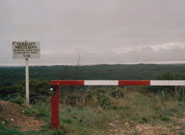Dr Peter Coates, the project’s Principal Investigator, said: “The black smoke billowing from burning oil wells during the Gulf War of 1990-91 directed media and public attention towards war’s environmental impact. Yet even before the first bomb is dropped, preparation for warfare materially and imaginatively reshapes landscapes and environments. Yet this form of military mobilization remains under-researched. Our project seeks to rectify this neglect through a comparative analysis of the emergence, management and meaning of militarized landscapes.”
The project will look beyond the common assumption that militarized landscapes are by definition environmentally damaged to explore the role of military lands as reservoirs of biodiversity. Such lands are often superior in `green’ value to surrounding non-militarized landscapes subject to intensive agricultural practices and other forms of human encroachment.
The status of military lands (defence estates) as landscapes emptied of human residents and civilian activities is another central ingredient of the study. It will also consider the challenges to militarized landscapes from those seeking access and a share of decision making and control. Of special interest is the interplay between the imperatives of defending the nation and defending nature.
The focus on British, French and American histories will bring out the common ground and divergences between national military cultures and the local, national and continental specificity of their expression and impact on the landscape. The project will provide a vital historical perspective on highly topical questions of military power and environmental responsibility.
The project will be comprised of a number of studies. Dr Peter Coates, the Principal Investigator will examine the conversion of military sites in Colorado into wildlife refuges. Dr Tim Cole, the Co-Investigator will look at the consequences of landscape militarization for human communities through a case study of Tyneham in Dorset and the recent `museumification’ of this famous `ghost village.’ A post-doctoral Project Researcher, Dr Chris Pearson will explore the militarized landscapes of post-1945 France and a Project Student will pursue a doctoral thesis on the `greening’ of Britain’s Ministry of Defence.
Two external Project Partners will assist the investigations. The UK Defence Estates’ Environmental Support Team, based in Warminster, Wiltshire, will facilitate the work of the Project Student. Icon Films, a Bristol-based independent film company specializing in history and natural history documentaries, will collaborate with the researchers and the Defence Estates in the production of a TV proposal on the project.
Arts and Humanities Research Council: Each year the AHRC provides approximately £90 million to support research and postgraduate study in the arts and humanities, from archaeology and English literature to design and dance. In any one year, the AHRC makes approximately 700 research awards and around 1,500 postgraduate awards. Awards are made after a rigorous peer review process, to ensure that only applications of the highest quality are funded. Arts and humanities researchers constitute nearly a quarter of all research-active staff in the higher education sector. The quality and range of research supported not only provides social and cultural benefits but also contributes to the economic success of the UK.
The Landscape and Environment Research Programme aims to establish distinctive, innovative and engaging arts and humanities research perspective on landscape and environment through projects of the highest quality and international significance. Across the range of its activity, the Programme will draw on a range of disciplinary expertise and resources to produce work which is critical and creative, collaborative and communicative, and seeking to change the ways landscape and environment are understood. The Programme has a budget of £5.5 million and is running from 2005 to 2010.
